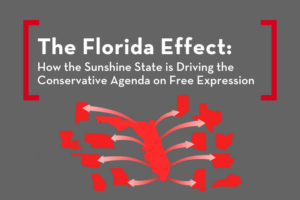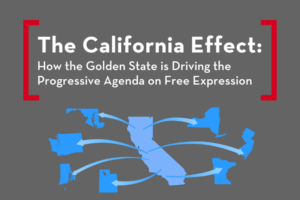Ahead of 2024, Two Bellwether States, California and Florida, Are Establishing Laws and Policies That May Affect All Americans’ Free Expression
Across the U.S., state legislatures are increasingly the agents of major policy decisions impacting free expression. A number of states have banned or restricted access to TikTok, significantly restricted drag performances, banned books, penalized protesters, and barred certain subject matters from classroom discussion. Each of these policies is a limitation on the freedom of expression, a decision by the state government to suppress speech it disfavors.
The free exchange of ideas and uninhibited creative pursuits–our freedom of expression–are necessary to our collective progress and to a healthy democracy. Today, especially in the face of gridlock in Congress, many of the most meaningful policy battles affecting these freedoms are playing out at the state level – the venue in which some of the most sweeping, groundbreaking, and influential new legislation is being proposed and passed.
Two states in particular, Florida and California, are engaged in a legislative arms race with national repercussions. Florida and California often serve as legislative laboratories where new policies are tested out, and their legislation can inspire similar proposals around the country. PEN America has undertaken an analysis of free expression policy in these two states, which we share in this pair of reports: The Florida Effect and The California Effect. In them we grapple with the ways in which policymakers in these two influential states have attempted to legislate free expression questions in this country, for better and for worse, and what we, as a nation, can expect to see as a result–especially as we approach the 2024 general election.
On the extreme side of the ledger, Florida is setting an agenda of unprecedented censorship, rigging the system to favor the speech of those in power and silencing dissenting voices. The assault on free expression in Florida is almost without peer in recent U.S. history. The state enacted one of the first laws restricting teaching about race and gender in schools and businesses, entitled the Stop W.O.K.E. Act. It was also one of the first to restrict teachers from discussing sexual orientation in classrooms with its so-called “Don’t Say Gay” bill. The legislature attempted to dismantle key protections for journalists and others who criticize politicians and public figures. It has joined the growing list of states enacting content-based restrictions on drag shows and other gender non-conforming performances. The list goes on.
In examining the state’s recent policy efforts, it can seem that the solution to every problem identified by Florida policy-makers and its governor, Ron DeSantis, is to suppress speech. But not always. Importantly, Florida’s speech-related efforts seem designed to protect and enhance the speech of those who hold political power in the state, while simultaneously inhibiting the speech of those who would criticize them or their conduct in office. Most concerning, other states with overwhelmingly Republican legislatures are paying attention and following Florida’s lead.
In California, legislators have been struggling to address difficult policy questions, to mixed results for free expression. California, home to the television and movie industries and to Silicon Valley, influences free expression and culture globally–including through its regulatory policies. In the past few years, however, the state has leveraged its size and its largely progressive bent to propose new policies that impact free expression, and that have spurred left-leaning states to similar action. In some places, these new policies have been unambiguous wins for free expression–such as with new laws aimed at decriminalizing artistic expression and protecting journalists as they cover protests.
In other areas, the record is more mixed. For example, California enacted legislation requiring tech companies to be more transparent about their content moderation rules, alongside legislation that forces these companies to examine whether their services could cause harm to minors. These laws, while well-intentioned, create a significant risk that the state government will have undue influence over what speech can appear online. California is taking a similarly complicated approach to book bans and to diversity, equity, and inclusion efforts at universities. The goals are laudable in terms of enabling access to information and fostering more inclusive, diverse campuses, but the impacts could raise concerns for free expression. And, as with Florida, other states are following California’s example and similarly mixed results are expected.
These reports are intended to illuminate how legislation that could be replicated across the country will impact free expression, and to foster understanding of the trends in free expression that are likely to unfold at the state – and federal – level over the coming years.
These PEN America reports demonstrate not only that free expression is essential to a democratic society, but that policymakers’ approach to these issues is nearly as important as the policies themselves. The governors and the state legislators responsible for these policies must be held accountable for choices that would harm the fundamental freedom of expression, lauded for the choices that would protect it, and pressed to consider the impacts of policy on free expression, even when it is not the central issue driving legislation. These reports are a step toward ensuring such accountability.


